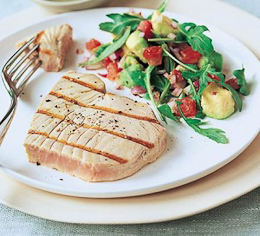Basic Dietary and Nutritional Requirements
Thousands of people every year choose to take an active interest in their general levels of physical fitness. Many people choose to focus on increasing physical activity. Others choose to begin eating healthier, more nutritious foods. However, no effort that truly focuses on increasing levels of health and fitness can be effective without a combination of both a well rounded exercise routine that is performed regularly and the consistent intake of a balanced whole foods diet. This category and the corresponding pages and articles are designed to shed light on the dietary and nutritional aspects associated with supporting and complementing your aerobic exercise efforts. Food and AerobicsThere are different dietary and nutritional requirements for each method used to increase levels of general fitness. The food that you eat serves as fuel for the various activities in which you partake. Different activities require different fuels and thus require different foods. While some people consider dieting to be a difficult task, you can follow some simple rules to ensure that your diet compliments your aerobic training. Follow these rules when designing your aerobic dietary plan: WaterDrink plenty of water. Eight glasses of water (8 oz.) are recommended. However, physical activity increases these requirements. Whenever you participate in an aerobic activity, you should drink water during every break. As breaks should occur at fifteen minute intervals, you will likely get plenty of water. You should not drink cold water when exercising. Doing so can be refreshing, but it can also cause stomach cramps. Drink water that is at room temperature while working out. Many people consider sports drinks that contain electrolytes as a viable alternative to water. This is certainly the case if your workout lasts more than 45 minutes. Any less than 45 minutes and the sports drink simply becomes empty calories. Stick to water for short workouts. If you are participating in a sporting event (baseball, football, hockey), sports drinks are an excellent choice to maintain energy levels. CarbohydratesThe majority of your diet should consist of healthy, natural carbohydrates. These should not come from sugars (even though sugar is packed with carbohydrates). Obtain your carbohydrates from natural sources such as rice and whole grains. 
Ideally, your diet should consist of 3.6 grams of carbohydrates for each pound that you weight. As you can see, this can really add up quite quickly depending on your weight. Before participating in an aerobic activity, have a small snack that consists of both protein and carbohydrates. This snack could occur right before the activity but should occur about 20 minutes before. If you have a drive to the gym or shower in the morning before working out, eat your snack in the car or before you shower. Keep the snack very small. Half of an energy bar is acceptable as the pre-workout snack. You can eat the other half when you are done to replenish energy stores. ProteinIf you are adding strength training to your aerobic routine, protein is especially important. However, all aerobic trainers should consider protein to be an integral part of their diet. After all, the amino acids that make up proteins are the small acids that make every biological function of your body possible. For those trying to lose weight, diets high in protein and fiber are very likely to curb cravings and make you feel full faster and longer. On a very basic level, it is recommended that you eat 1.4 to 1.8 grams of protein per kilogram of body weight each day. This is usually simple with a meal that includes a lean cut of meat and snacks of healthy nuts (almonds, walnuts) and energy bars during the day. Advanced aerobic trainers and strength trainers may require more protein than the beginner during the day. As a general rule, aerobic training should make you feel stronger and healthier. If you feel weak or faint, chances are that your diet is low in either carbohydrates or protein. The Aerobic Training DietAerobic training has its own dietary and nutritional requirements that are unique from any other form of training. To fully understand the needs inherent to aerobic training it is important to understand just exactly how aerobic training works. This information can be found on another part of this website. By using this information you can get a firm understanding of what is required for aerobic activity to take place within the body. By providing your body with its required dietary and nutritional needs you will put yourself in a much better position to succeed in your efforts to meet your general fitness needs. Along with this, it will also make your efforts much more efficient. 
With how hectic the average person’s life is these days, you want to be assured that you are gaining the maximum benefits possible in your time devoted to physical activity. This can be assured by making sure that you body has all of the dietary and nutritional requirements that needed for aerobic activity. The following pages and articles contain information outlining exactly what nutrients your body needs for aerobic activity and how you can go about obtaining these nutrients. There are a number of different specific diets that you can follow along with a number of different tips about foods that you should consume more of and foods that you should try to avoid. There is also information pertaining to what you dietary habits should be like directly preceding and directly following an aerobic workout. Many believe that it is during this time that you should be most concerned with obtaining your dietary and nutritional requirements as it is important to understand that when your body exerts a high level of energy it depletes it's reserves of many important nutrients. |
Copyright © 2026 FitnessHealth101.com All Rights Reserved
FITNESS TOPICS
FITNESS REVIEWS
FITNESS & HEALTH GLOSSARIES

